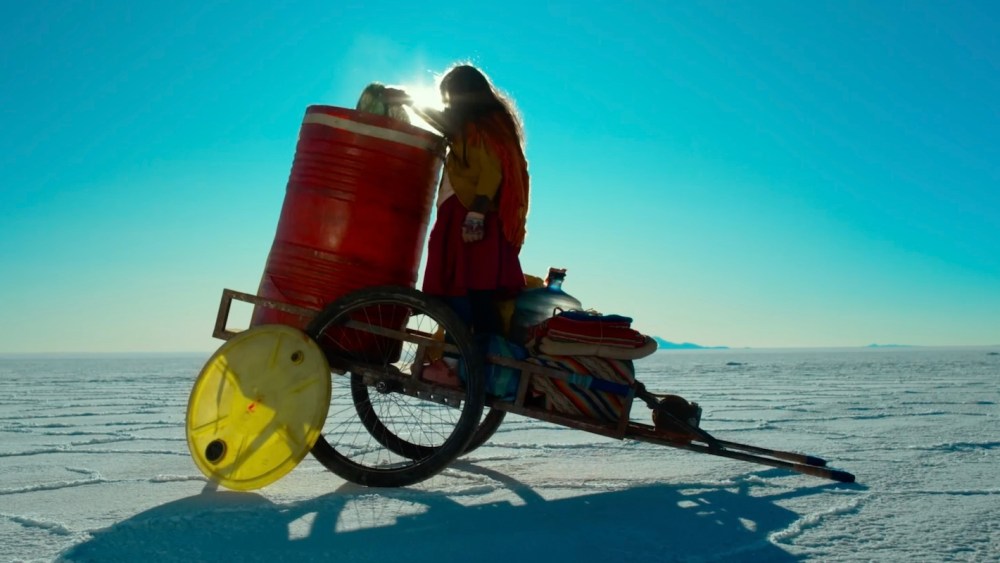Barcelona-born, England-trained Alberto Sciamma has forged his own path in features over the last three decades, attracted to oddball themes and genre mashups that often wound up more intriguing in description than execution. But after not quite landing the eccentric conceits of “Killer Tongue,” “Black Plague,” “Jericho Mansions,” “Bite” and “I Love My Mum,” he’s hit an unexpected home run in “Cielo,” a U.K. production shot on location in Bolivia.
The Spanish-language magical realist exercise about a young girl’s bizarre cross-country journey is like a kinder, gentler version of Jodorowsky’s fantastical narratives. While not lacking flaws, it offers considerable ambition, aesthetic beauty and bittersweet enchantment, with a surprisingly wide viewer appeal. It is at once this writer-director’s sweetest film and by far his most accomplished.
“Cielo” begins in a dismal desert outback with a series of shocks: First, a young girl catches a fish at a river bank, swallows it in one grotesque gulp and passes out. Then she bludgeons her perpetually drunk, abusive father (Juan Carlos Aduviri) to death, saying “I love you, papi.” This demise causes rejoicing for her mother (Carla Arana), whom little Santa (Fernanda Gutierrez Aranda) nonetheless kills as well, seemingly with that adult’s consent.
Mom’s corpse is then put in a salted plastic barrel for preservation’s sake, and loaded onto a cart the daughter is prepared to pull all the way to the distant sea. Church teachings, superstition and visions have convinced our heroine that she and her beloved ma can only escape their lives’ misery to date by somehow reaching Heaven. No matter what skepticism gets encountered en route, the precociously self-assured Santa is confident they’ll get there, with mortality just a temporary inconvenience to be overcome in the eternal afterlife.
This may well sound like something that would’ve been played as a pious Christian allegory in another era. In Sciamma’s hands, it has Bunuel’s prankishness and doubt, if not his outright disdain toward organized religion. The local padre (Luis Bredow) is a sympathetic figure, as eventually is police chief Gustavo (Fernando Arze Echalar). Initially dismissive, both men become converts to Santa’s cause after witnessing miracles apparently generated by her presence. Still, she is more trusting toward a bus-full of raucous traveling female wrestlers who offer transportation once a truck she’s borrowed from the priest conks out. Santa generates protective parental feelings in these grown-ups, particularly luchadora La Reina (Sasha Salaverry). However, she is primarily advised by that fish swallowed at the outset — evidently a spiritual guide of sorts, though she also keeps a separate one in a bucket of water, just “for company.”
“Cielo” (i.e. “sky”) is full of such surreal humor, though the wandering narrative never strays far from a sense of the real world’s cruelty. Santa is both insulated by innocent faith and grimly experienced beyond her years, a character conception that might easily cloy or grate in less fortunate circumstances. But not only does Sciamma sustain a very tricky tonal balance, he also has at his disposal a child actor (Aranda was just 8 during production) whose remarkable maturity seems innate rather than forced. The other performers provide effective notes of warmth and comedy, though Echalar occasionally oversells the kind of tearful awe this movie is otherwise careful not to push too hard.
Digressive but never dull, “Cielo” sometimes threatens to lose its own thread. But there’s an internal logic at work that maintains audience belief that a tangible destination lies ahead. Even if it didn’t, getting there would be a sensory pleasure: Alex Metcalfe’s widescreen cinematography, which won awards at both Fantasia and Fantosporto, finds vivid color and compositions everywhere. Spectacular scenery certainly helps, as the story traverses from dusty Andean plains to harrowing mountain roads to capital city La Paz. With an occasional digital-effects assist for more fanciful moments, they all acquire an otherworldly feel here, even episodes of violent tragedy getting softened by an air of fairy tale. Sonic contributions are equally bold, largely divided between very different original-score elements created in Bolivia and England by composers Cergio Prudencio and Dave Graham, respectively.

